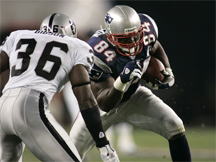 Many writers believe that a sports story is nothing more than writing a non-fiction piece describing the events of a baseball game or boxing match. Their plots, if writers decide to flesh one out, are often similar, slight and threadbare with constant use.
Many writers believe that a sports story is nothing more than writing a non-fiction piece describing the events of a baseball game or boxing match. Their plots, if writers decide to flesh one out, are often similar, slight and threadbare with constant use.
During the summer I teach a course on sports writing. When I ask my students to cover a sporting event and “write a sports story” (with no further instructions), 9 out of 10 students watch a sporting event on TV or attend a baseball game and rehash on paper what they have observed. They write about which player scored what point in what inning or at what quarter. Nearly every student’s article sounds the same, with the same plot, the same characters, the same scores, and nearly identical settings. Very few aspiring student writers realize that they can either choose to write the typical objective, newspaper-style sports article (as mentioned above), or they can write a subjective, human-interest sports story or a sports story based entirely on fiction.
Familiarize yourself with the sport.
 To write any successful sports story (fiction or non-fiction), the writer must familiarize himself with the precise details of the sport. Even the smallest error in covering or describing a particular sport may enrage diehard sports fanatics who know something about how the sport is played. You must build your plot solidly and substantially, with the real human interest of your sports story attracting the sympathy and attention of the reader.
To write any successful sports story (fiction or non-fiction), the writer must familiarize himself with the precise details of the sport. Even the smallest error in covering or describing a particular sport may enrage diehard sports fanatics who know something about how the sport is played. You must build your plot solidly and substantially, with the real human interest of your sports story attracting the sympathy and attention of the reader.
It has always seemed strange to me that college graduates who have turned to writing neglect the creative writing aspects of this genre. Granted that the sports story will not live and make its author famous, but how many stories do? It will, however, pay the bills because all sports stories are marketable.
Many writers who have played sports competitively in college, sometimes turn outside of their city or state for material, when some of their own observations and experiences would make splendid plot material.
- Do you understand the feelings of a football player, as he plows through a heavy line?
- Did you ever experience the hot flood of shame that sweeps over a ball player when he “boots” a ball in a close game?
- Do you know how a boxer feels, tottering on the verge of a knockout, or the thrill of fear that stabs at a jockey’s heart when his horse stumbles?
If you do, never mind about your local color. It will shine through the lines as you write. A great sports writer knows how to make his reader hear the crack of the bat against the ball, make him see the white speck as it rises against the blue of the sky, and make him share the feelings of the outfielder as he misses the ball.
Burt L. Standish’s “Merriwell” and “Lefty” stories are tales of sport that have made the author’s name a household word.
Dan Topolski wrote a non-fiction sports book (True Blue: The Oxford Boat Race Mutiny) on the 1987 Oxford-Cambridge Boat Race and won the William Hill Sports Book of the Year in 1989.
Have you ever heard of Jack London, Charles Van Loan or Allen Sangree—the legendary writers?
Ashton Stevens, the well known dramatic critic, said of Jack London, the great primitive fictionist: “He has, in his novel ‘The Game,’ translated to the stage a prize fight, better than Bernard Shaw in either novel or play.” And you must be aware that prize fighting (including mixed martial arts) is regarded as a sport by several million enthusiasts, and good stories of the ring always sell.
 You can find many magazines that demand exciting, fulfilling and heart-felt sports stories. Magazines for teenagers and kids (including teenage religion magazines) have a constant demand for sports-related stories that teach readers life-building skills. The higher class periodicals, such as ESPN The Magazine, Sports Illustrated, Golf Digest, and Health and Fitness magazine, offer space for sports stories with specific and broad appeal. An often overlooked market to sell your sports articles are regional parenting magazines (yes, parenting magazines), which always seek sports stories that appeal to local interests.
You can find many magazines that demand exciting, fulfilling and heart-felt sports stories. Magazines for teenagers and kids (including teenage religion magazines) have a constant demand for sports-related stories that teach readers life-building skills. The higher class periodicals, such as ESPN The Magazine, Sports Illustrated, Golf Digest, and Health and Fitness magazine, offer space for sports stories with specific and broad appeal. An often overlooked market to sell your sports articles are regional parenting magazines (yes, parenting magazines), which always seek sports stories that appeal to local interests.
It is assumed that you can write some kind of salable story. If you can do this, and have a deep rooted liking for and understanding of American athletics, then by all means, write a sports story.
If you cannot evolve a plot with something newer and unique in it than a homerun in the ninth inning with the basses full, look up some old ball player, golfer or tennis pro and get him talking about himself. I have met very few retired sports legends who were not willing to talk about their past triumphs, defeats and successes. In this way you can pick up enough plot germs for a dozen stories.
 I will tell you how I picked up a plot for a creative non-fiction sports story.
I will tell you how I picked up a plot for a creative non-fiction sports story.
If you keep your eyes open and your brain alert you can find them just as easily.
One day after I had just completed an interview with a local police officer at the police station in City Hall, I observed two police officers escorting a big guy into the station. Although middle-aged, he was muscular in stature, with a brutish face, “cauliflowered” ears, and the general marks and scars of having fought too many heavyweights in a boxing ring. I asked the police sergeant why the police had arrested the man.
“He killed a guy out west a few years ago, and we just got our hooks on him now.” The police sergeant, knowing I wrote a local sports column for our community newspaper, told me, “He’s Devin McNiel. You might be familiar with him. He was a semi-pro boxer from New Orleans back in the ’70s.”
I made a note of it, and promptly forgot the affair. A few days later in reading over my notes, I saw the item, and the big man’s heavy face flashed before my mental vision. Of course he would obviously be out of place as the hero of any story under the sun, and so I was provided with a first class villain.
 The murder he had committed in the west—I used this as a starting point. As he had been captured in the east I had him brought to New York by a man interested in boxing. A strong young man and a pretty girl are nearly indispensable, and so I used them as the next ingredients. With those four characters, the hustling city of New York as a background, and a knowledge of the inside workings of the “boxing game,” I knew I could create some interesting situations. I made a novelette of it, and Street & Smith bought it. A twenty thousand word story from the brutal face of a prize fighter!
The murder he had committed in the west—I used this as a starting point. As he had been captured in the east I had him brought to New York by a man interested in boxing. A strong young man and a pretty girl are nearly indispensable, and so I used them as the next ingredients. With those four characters, the hustling city of New York as a background, and a knowledge of the inside workings of the “boxing game,” I knew I could create some interesting situations. I made a novelette of it, and Street & Smith bought it. A twenty thousand word story from the brutal face of a prize fighter!
If you really think you have a sports story in you, write it.
The field is large and constantly increasing. Of course it will be hard to get away from the conventional, but if you cannot do it, you are not a writer: you have not the power of imagination and grit.
Whether you decide to write the conventional, news-style sports story, a sports story based on fiction or non-fiction, you can always find editors ready and eager to buy good sports stories. Many magazines, websites and newspapers demand good sport stories, particularly those dealing with baseball, football, soccer, mixed martial arts, golf, hockey or the ring.



